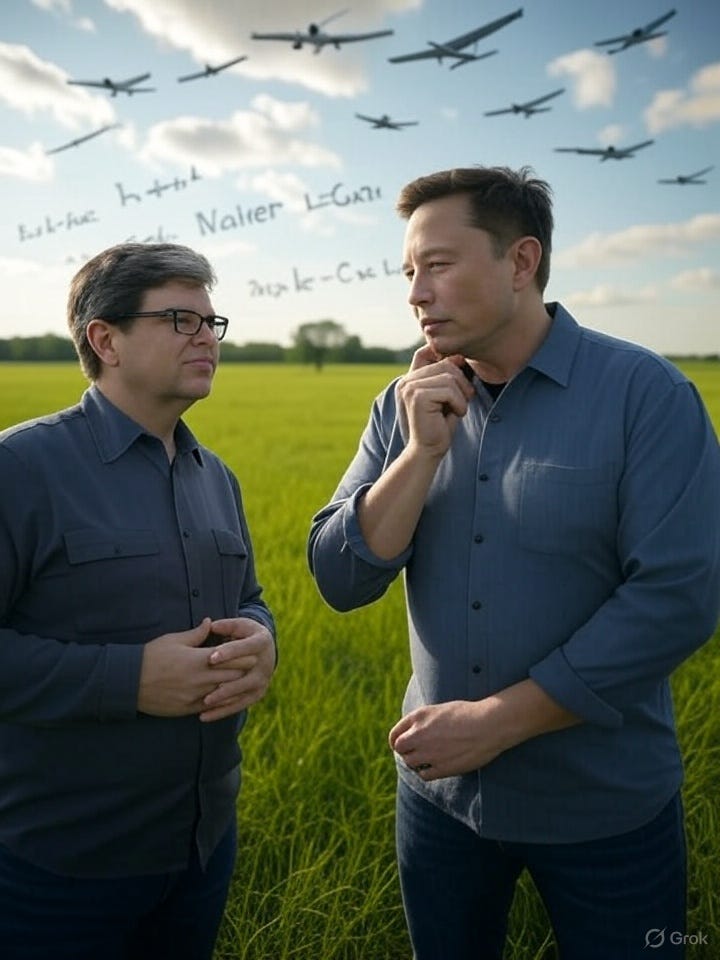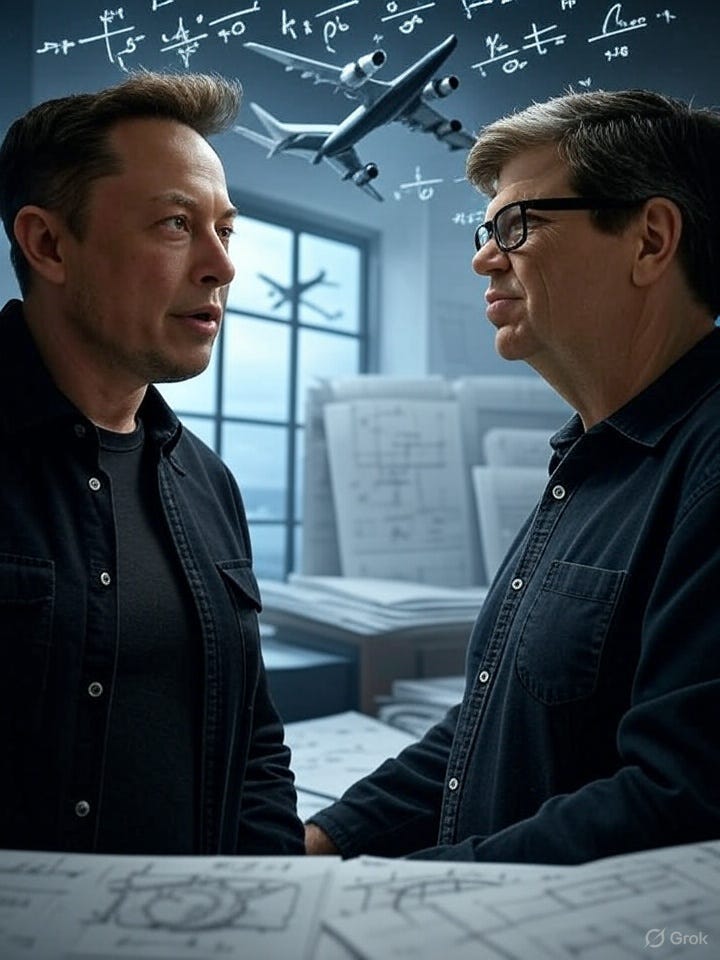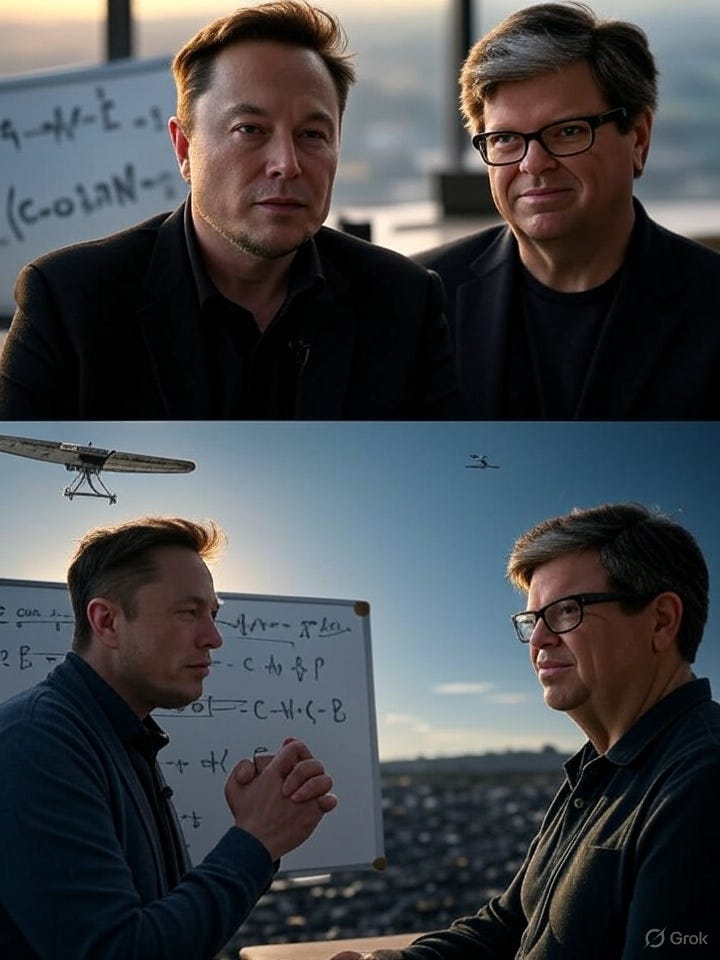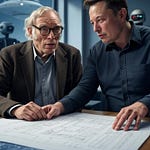A few weeks ago, a public confrontation between Elon Musk and Yann LeCun, one of the leading figures in artificial intelligence (AI) at Meta, captured widespread attention. What began as a disagreement about the future of AI and its potential risks evolved into a deeper debate about the relationship between science, engineering, and capitalism. This article explores how this controversy raises questions about the extent to which science is necessary for technological progress and when it’s time to take action, even without all the theoretical answers. A fascinating example of this paradox is the development of aviation: planes soar through the skies despite the fact that the equation governing their flight, the Navier-Stokes equation, remains formally unsolved. Here, we argue that science should be a means to facilitate innovation, not an end in itself that paralyzes progress.
The Musk-LeCun Clash: Beyond AI
The debate between Musk and LeCun stemmed from opposing views on AI. On one hand, Elon Musk argues that artificial intelligence will soon surpass human capabilities, necessitating its development in a way that benefits humanity. On the other, Yann LeCun considers these concerns exaggerated, asserting that we are far from achieving human-level AI and that there is no immediate threat. However, the discussion didn’t remain in the technical realm. Soon, both shifted from critiquing arguments to launching personal attacks. LeCun proudly defended his work as a scientist, while Musk lashed out at modern science, claiming it is overly focused on publishing papers rather than producing practical results.
This shift in the conversation is what makes the clash particularly compelling. Beyond AI, Musk questioned the value of a scientific system that, in his view, prioritizes theory over action. His stance invites us to reflect: to what extent do we need to wait for science to answer every question before innovating? Or is it possible to move forward using ingenuity and direct experimentation? To explore this idea, there’s no better example than the historical case of aviation.
Planes Fly Without Solved Equations
One of the clearest examples of practical innovation outpacing scientific theory is the development of airplanes. From a technical perspective, flight is governed by the laws of aerodynamics, which are mathematically described by the Navier-Stokes equations. These equations, fundamental to fluid mechanics, explain how liquids and gases move, including the air that supports an airplane. Yet, here lies the paradox: the exact solutions to the Navier-Stokes equations, in their general form, remain unknown. In fact, solving this problem is one of the seven Millennium Prize Problems established by the Clay Mathematics Institute, with a one-million-dollar prize for whoever achieves it.
Despite this scientific uncertainty, planes took to the skies long before anyone even attempted to fully solve these equations. The Wright brothers, pioneers of aviation, achieved the first powered flight in 1903 without relying on sophisticated mathematical calculations. Their success was rooted in intuition, observation, and a trial-and-error approach. They built models, tested wings in rudimentary wind tunnels, and tweaked their designs until they worked. They didn’t need a formal solution to the Navier-Stokes equations to fly; they simply did it.
This example illustrates a powerful truth: human ingenuity and practical experimentation can forge paths that theoretical science has yet to pave. Solving the Navier-Stokes equations could revolutionize our understanding of fluid mechanics and bring advances in fields like meteorology or engineering, but its absence did not prevent aviation from transforming the world.
Science as a Means, Not an End
The case of aviation leads to a broader conclusion: science should be a tool in service of innovation, not a barrier that halts it. While scientific rigor is essential for understanding how the universe works, falling into “overanalysis” can sometimes slow progress. In simple terms, we don’t always need to know exactly why something works to make it work. History is full of examples where practical advances preceded theoretical explanations, from the steam engine to the first antibiotics.
Musk’s comment about modern science points to this risk. When the academic system becomes fixated on publishing papers and seeking perfect solutions, it can grow rigid or, as has been said, “monolithic.” This doesn’t mean scientific research lacks value—on the contrary, it’s a cornerstone of our civilization—but it does need to strike a balance with direct action. If science is the art of discovering how reality works, sometimes the best way to learn is to ask the universe itself, experimenting and observing what happens, rather than waiting for a definitive theoretical answer.
A Call for Reflection
The controversy between Musk and LeCun, though sparked by AI, leaves us with a deeper lesson about how to move forward as a society. Musk’s stance, while provocative, holds a valid point: the scientific community must avoid falling into paralysis by overanalysis and be willing to reinvent itself. This isn’t about abandoning the scientific method but about complementing it with a more flexible mindset that values intuition and practical experimentation.
In conclusion, planes fly even though we haven’t solved the Navier-Stokes equation, a reminder that progress doesn’t always wait for science. As a civilization, we must keep “flying”—both metaphorically and literally—balancing the rigor of knowledge with the courage to act. Science is invaluable, but it must not become a barrier that prevents us from soaring into the future. It’s time for the scientific community to reflect and ensure that its work propels, rather than restrains, the human ingenuity that has taken us so far.















Share this post